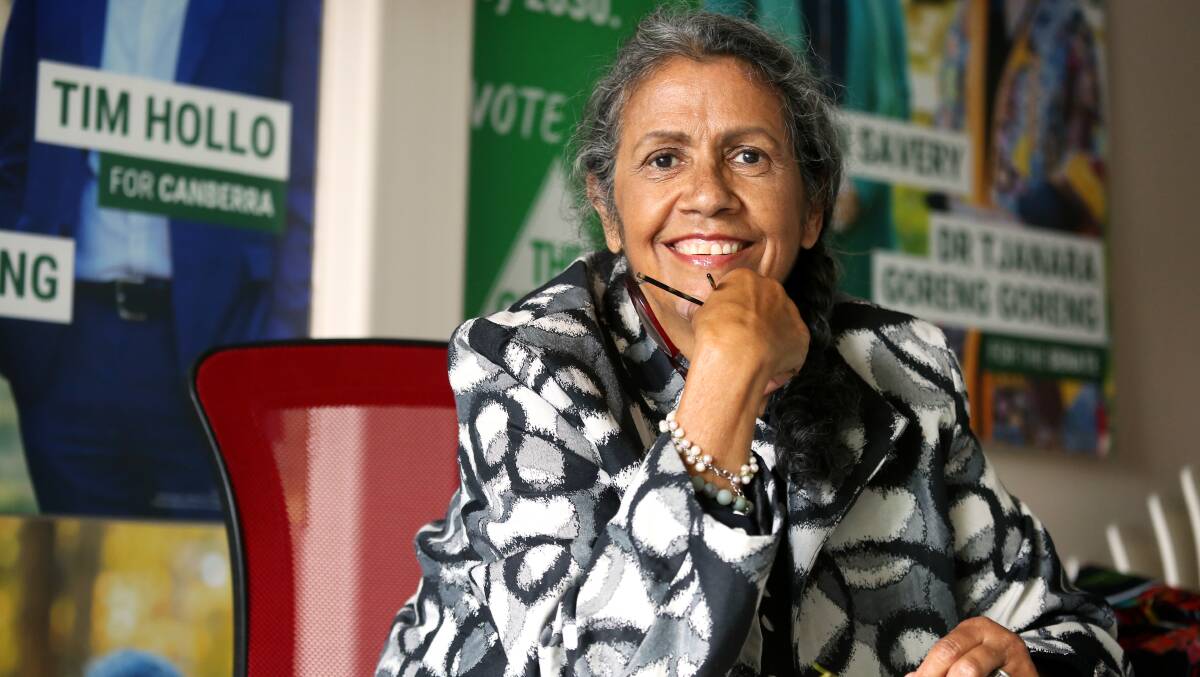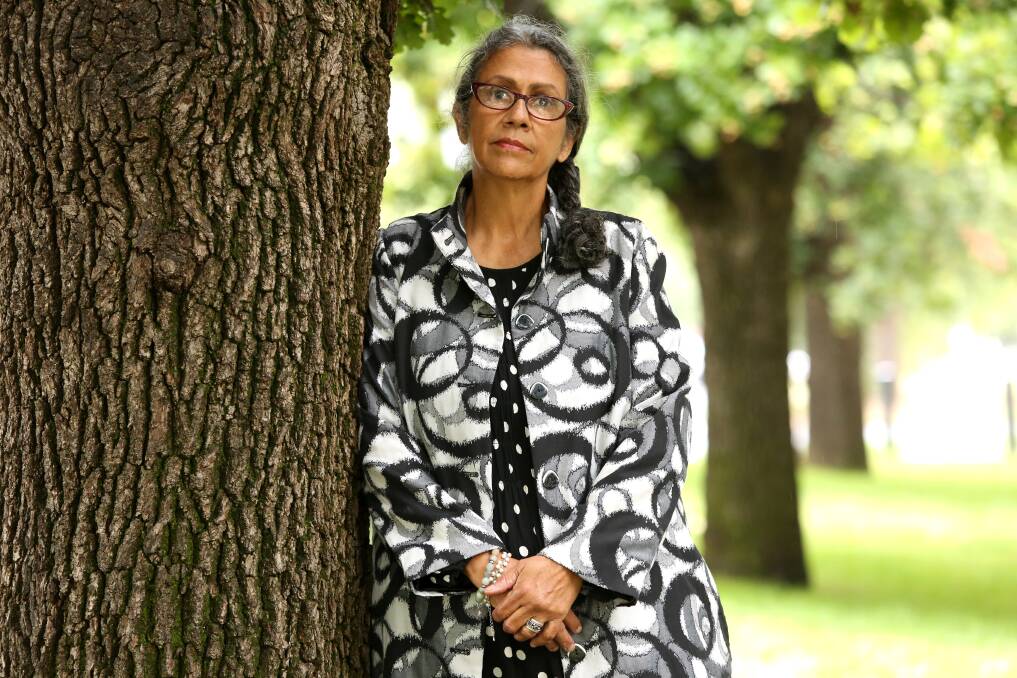
Tjanara Goreng Goreng was convicted, lost her public service career and was declared bankrupt after leaking confidential information in 2006 relating to the Northern Territory's Mutitjulu community. Now she wants to be an ACT Greens Senator to stand up for other whistleblowers and others who may come forward.
The Canberra Times can reveal the Greens, seeking to hold the balance of power in the 47th parliament, are campaigning on a public interest election policy to strengthen whistleblower protection laws and allow public servants to engage in political advocacy and activism outside of work.
Protecting the right of the public service to be "frank and fearless" is very personal to the 30-year public servant, unionist and academic. The Wakka Wakka woman faced up to 14 years in prison as a convicted whistleblower but ended up being fined, placed on a three-year good behaviour bond and was ultimately declared bankrupt. Her conviction was expunged several years ago.
"I know how hard it is. And nobody should be put through this," Dr Goreng Goreng said.
"My experience was so traumatic and revolting that I don't want that ever to happen to another public servant."
In 2008, the ACT Supreme Court found her guilty of leaking information on aspects of the Howard government's controversial Northern Territory intervention while working in Canberra at the Office of Indigenous Coordination. The intervention was framed as a national emergency and included the deployment of the army to protect Indigenous children from violence, sexual abuse, alcohol abuse and petrol sniffing.
She was accused of leaking several government emails which she argued in court did not constitute leaking, as the details contained were publicly available and constituted a standard part of her job as director of community engagement, dealing with sexual abuse.
Dr Goreng Goreng recounted exposing the planned army deployment as an impulse decision to someone she said she could not say no to.
"I was talking to my cultural sister at Uluru where all of this was happening. And she asked me a question, and when she asked me that question, I told her the truth. So that's how it happened," she said.
"I said to her, 'If I tell you the answer to this question, my job and my life is gone as I know it and yours probably will be, too. Do you want to hear the answer'? She said, 'Yes, I want you to tell me because we are honest to each other as black women. We don't sit back and stand back'.
"I didn't leak anything, particularly to her. I just said, 'Yes, I've seen an email that says the army is coming in. That's between you and me. What you do with it will affect our lives from here on in'."
She says she does not regret her decision. But there was a lot to regret, including police raids on her home.
"I valued my job. I had to pay my mortgage, you know. I had to look after my child," Dr Goreng Goreng said.
"I lost my confidence. Disappeared. Every week I was ringing up the Queanbeyan mental health service to say, I'm completely overwhelmed. I need to talk to somebody. Thinking I don't need to talk to anybody but then I would be overwhelmed and have panic attacks driving home."
Worse still, she said, was that others were warned not to go near her or do anything similar.
"They [were warned they] would be in the same situation as me, which I think is so wrong," she said. "How could you threaten people like that? Like, he obviously thought he could."
The Greens' 2022 policy to support whistleblowers includes the creation of a whistleblower protection commissioner and legislation to ensure public servants can engage in political advocacy and activism outside of work. The party also wants to make sure departments don't investigate the original complaint.
The 2016 independent Moss review into the complicated public interest disclosure legislation found the law was overly complex, with whistleblowers rarely feeling supported after making disclosures and employment-related grievances clogging up the system.
"For me in terms of the whistleblowing stuff, the protection for someone who was a public servant who gives frank and fearless advice is very important, because people don't do it lightly. And people don't do it just because they want to randomly be a criminal," she said.
"I think there's a general feeling in the entire community that anyone that whistleblows, particularly in a government town, is like a bit of a bludger in the sense that they're snitching."
So there's law change and culture change.
Behind all this, the Greens are looking for a sea change.
Dr Goreng Goreng is running for the progressive party in a tightly-contested race for just two Senate seats which have been returned to either the Labor or Liberal parties since 1975.
She is up against prominent independent candidates, academic Kim Rubenstein and former Wallabies captain David Pocock. The challengers have some similar positions on key ACT federal issues such as climate change, territory rights and a federal ICAC.
The Greens are a significant force in the ACT. At the 2020 territory election, the party secured a 3.6 per swing, electing six members and improving its standing in the Labor-Greens ACT government. Federally, it has polled above half a seat quota at the last six elections with a highest vote of 22.9 per cent in 2010. In 2019, the Greens, with lead Senate candidate Penny Kyburz, secured 17.7 per cent of the vote.
The new Senate voting system, which has abolished the group voting ticket, is regarded as giving advantage to the major parties. In the ACT, there aren't many groups on the ballot paper and more preferences tend to be allocated.
With weaker preference flows, ABC election analyst Anthony Green contends the Liberal vote would need to be well short of 33.3 per cent to miss out on a seat.

"If the Liberal vote drops below one-third, below 33 per cent, there is the possibility that those preferences will be more important," Mr Green said.
"The question is how strongly they flow."
Dr Goreng Goreng has been interested in politics for some time, particularly through her work in the Greens First Nations Network. She cares for husband who has Alzheimer's.
She said the Greens have clout at the territory level and could have more federally. She's an advocate for more ACT senators, perhaps four.
"We have to talk to the crossbench. So why not? Why shouldn't there be more voices in the development of legislation and as many as possible," she said.
"So that climate action stuff is really front and centre of people's minds because now they really know it. You know, we've had fires, we've had floods. Now they really get it and we get it from a First Nations perspective. If we don't take care of country, it's gonna do this."







